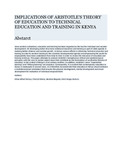IMPLICATIONS OF ARISTOTLE’S THEORY OF EDUCATION TO TECHNICAL EDUCATION AND TRAINING IN KENYA

View/
Date
2021-09Author
Khisa, Alfred Simiyu
l Atieno, Cherry
Bagada, Beatrice
Buhuru, Erick Kangu
Metadata
Show full item recordAbstract
Since ancient civilizations, education and training has been regarded as the tool for individual and societal development. All developing nation thus have embraced education and training as part of state agenda in realizing better citizenry and societal growth. In Kenya various efforts in reforming Technical education and training in order to reorient training to the countries developmental agenda and empowering the youth for employability have been undertaken from time to time in order to review the relevance of education and training in Kenya. This paper attempts to analyze Aristotle’s metaphysical, ethical and epistemological principles with the view to render salient ideas that contribute to the formulation of worthwhile theories of education in the context of Kenya’s 21st century realities. In addition, Aristotle’s views “experiential learning” and “lifelong learning” are analyzed. Consequently, it is evident that contemporary education in Kenya is inadequate in several ways. It is therefore recommended that education in Kenya should embrace a multidimensional orientation that ensures the physical development, mental development and moral development for realization of individual empowerment.
URI
http://dx.doi.org/10.46827/ejes.v8i2.3560https://www.oapub.org/edu/index.php/ejes/article/view/3560
http://ir-library.mmust.ac.ke:8080/xmlui/handle/123456789/2135
Collections
- Journal Articles [411]
